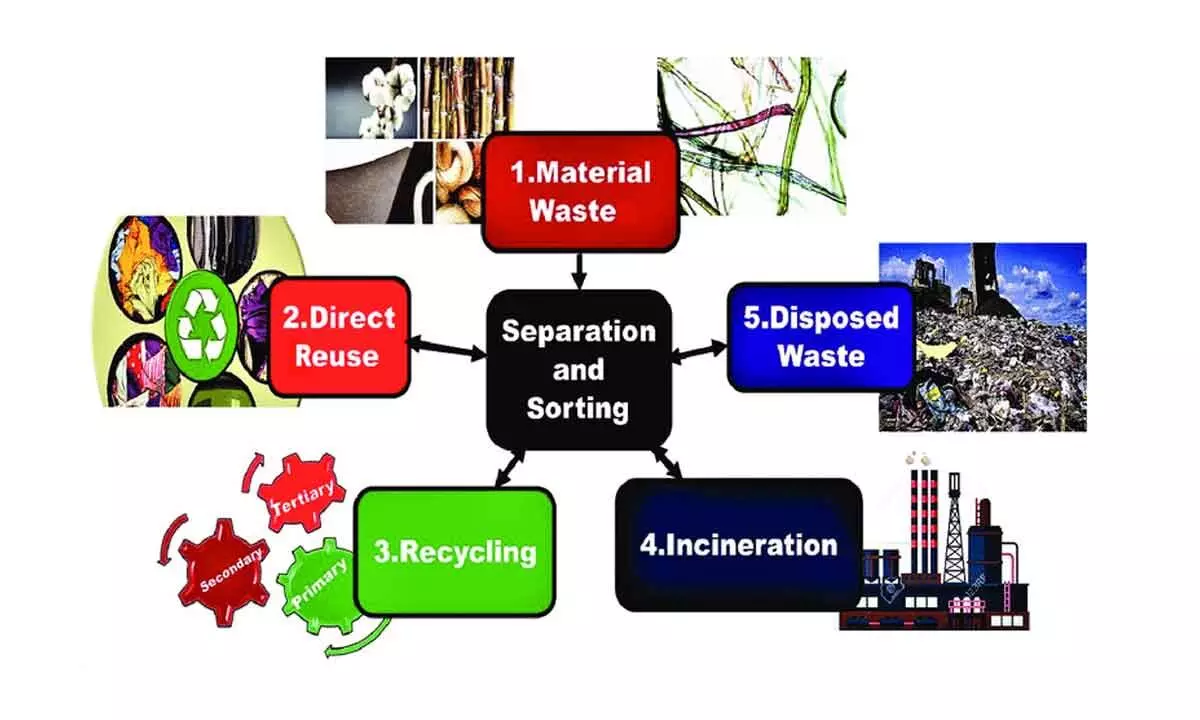Innovative recycling technologies helping build circular economies
Transforming waste into wealth is the way forward
image for illustrative purpose

By reimagining waste as a valuable resource and implementing circular economy principles, these companies are not only making a significant impact on sustainability but also capitalizing on lucrative opportunities in the recycling industry
In the global pursuit of sustainability and environmental stewardship, innovative recycling technologies have emerged as powerful tools for mitigating carbon footprints and fostering circular economies. These technologies not only contribute to a greener planet but also unlock new economic opportunities, turning waste into wealth.
Let's delve into some fascinating case studies that showcase the transformative impact of recycling initiatives.
Reverse resources-Revolutionizing textile waste: Recycling is a pioneering company in the textile recycling sector. Their innovative platform enables the efficient recycling of textile waste, optimizing material flows and reducing environmental impact. By partnering with fashion brands and manufacturers, reverse resources has created a closed-loop system where textile waste is transformed into new raw materials, contributing to circularity in the fashion industry while generating significant economic value.
Vegea: Sustainable solutions from grape marc have been acknowledged for their sustainable approach to leather production. Utilizing grape marc, a byproduct of winemaking, Vegea produces a vegan leather alternative that not only reduces waste but also minimizes the carbon footprint associated with traditional leather production. This innovative use of agricultural waste showcases the potential of circular economies in transforming industries and creating value from previously discarded materials.
Fleather: Harnessing Flower Waste for Vegan Leather highlights an inspiring example of turning flower waste into sustainable materials. Fleather, a vegan leather brand, utilizes floral waste from religious offerings in India to create eco-friendly leather alternatives. This innovative recycling process not only addresses waste management challenges but also promotes sustainable fashion choices, demonstrating the economic viability of circular solutions.
Syntoil: Transforming waste tires into valuable resources has gained recognition for its groundbreaking approach to recycling waste tires. Through advanced pyrolysis technology, Syntoil converts discarded tires into valuable resources such as oil, carbon black, and steel. This innovative recycling process not only reduces landfill waste but also contributes to resource conservation and energy efficiency, illustrating the economic potential of waste recycling initiatives.
Xilinat: The sweet success from agricultural residue focuses on transforming agricultural residue into xylitol, a valuable sugar substitute. By utilizing waste biomass from agricultural activities, Xilinat not only reduces agricultural waste but also creates a sustainable and profitable product. This innovative approach demonstrates how circular economies can leverage waste streams to generate revenue while promoting environmental sustainability.
Copia: Tackling food waste for social impact tackles food waste through innovative technology, connecting surplus food from businesses with communities in need. By preventing food waste and redistributing excess food to those facing hunger, Copia not only addresses social challenges but also reduces greenhouse gas emissions associated with food waste disposal. This holistic approach showcases the intersection of social impact and environmental sustainability in waste management initiatives.
Ewaster: E-waste recycling for environmental conservation specializes in e-waste recycling, recovering valuable materials from electronic devices while ensuring responsible disposal of hazardous components. By promoting electronic waste recycling, Ewaster contributes to resource conservation, reduces environmental pollution, and creates employment opportunities in the recycling sector.
These case studies exemplify how innovative recycling technologies are driving positive environmental and economic outcomes. By reimagining waste as a valuable resource and implementing circular economy principles, these companies are not only making a significant impact on sustainability but also capitalizing on lucrative opportunities in the recycling industry. The transition from waste to wealth is not just a vision but a tangible reality, showcasing the transformative potential of circular economies in shaping a greener and more prosperous future.
(The writer is co-founder of OnlyGood)

